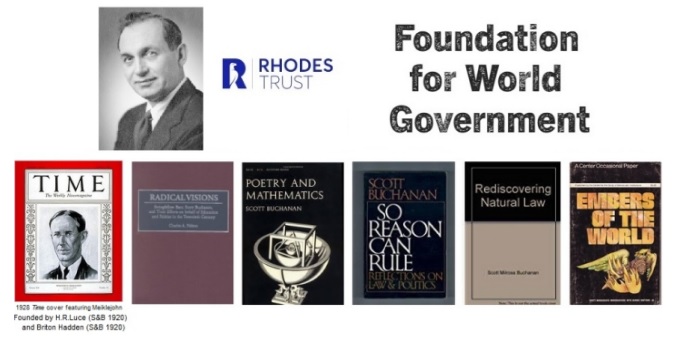
Scott Milross Buchanan (Rhodes 1917)
Educator. Amherst College. Rhodes Scholar, Balliol College, University of Oxford. Harvard.
During his undergraduate years, Buchana became personally close to Amherst’s president Alexander Meiklejohn (Pictured) and was strongly included by his ideas and about educations reform.[4][6]
2001 - Radical Visions: Stringfellow Barr [Rhodes], Scott Buchanan [Rhodes], and Their Efforts on behalf of Education and Politics in the Twentieth Century. by Charles A. Nelson.
Buchanan was reunited with Robert Maynard Hutchins (Wolf’s Head, Ford Foundation), then president of the Fund for the Republic. Hutchins invited him to help direct the fund’s project to clarify how a free society could best be preserved in the United States.[6]
Became one of the founders of the Center for the Study of Democratic Institutions where he was a senior fellow until his death. Buchanan left unpublished a manuscript entitled Truth in the Sciences, which he had written in 1950.[6]
1956 to 1957, Professor of philosophy and chairman of the Department of Religion and Philosophy at Fisk University in Nashville, Tennessee.[6]
1948 to 1958 - Trustee and Secretary of Foundation for World Government.[6]
1947 to 1949 - Director of Liberal Arts, Inc. , in Pittsfield, Massachussets. His consistent passion for the philosophy of Plato and for the Socratic method of inquiry in particular was made evident to a wide audience when he wrote the introduction to, and edited, The Portable Plato (1948), a very successful volume in the Viking Portable series.[6]
1938 - After considerable study at the Johns Hopkins Medical School, he published The Doctrine of Signatures: A Defense of Theory in Medicine.[6]
1937 to 1947, When Barr became president of St. John’s College in Annapolis, Maryland, Buchanan joined him as dean.
As chairman of the Committee on the Liberal Arts, Buchanan played a major part in organizing the university’s Great Books program.
Then Robert Maynard Hutchins(Wolf’s Head, Ford Foundation. Proponent of Select education books.), the President of the University of Chicago, invited him and Stringfellow Barr (Rhodes), Buchanan’s longtime friend, fellow Rhodes Scholar, and colleague at the University of Virginia, to join the Chicago faculty. [6]
1929 to 1936, Buchanan became associate professor of philosophy at the University of Virgina and, the following year, professor.[6]
1927 - “Possibility”explores “three kinds of possibility—imaginative, scientific, and absolute. ” his well-received study was described by John Dewey as “a first-class piece of much-needed intellectual work. “[6]
1925 - Assistant Director, People’s Institute In New York City.[6]
1925 - Ph.D., Harvard University.[6]
1 Year - Instructor, Philosophy at the College of the City of New York.[6]
1922 to 1924 - taught as an assistant in Harvard’s philosophy department.
WW1 - U.S. Navy. Religious persuasion made him a pacifist and a conscientious objector, he nevertheless entered the U.S. Navy in Jun 1918; he was discharged as an ensigh six months later.[6]
Died 25 Mar 1968, form Not Known. Age 73
[1] - Rhodes Database Scott Milross Buchanan (Rhodes 1917)
[2] - Amazon.co.uk - Books bby Scott Milross Buchanan (Rhodes 1917)
[4] - Education and Democracy: The Meaning of Alexander Meiklejohn, 1872–1964 By Adam R. Nelson
[5] - American National Briography -
[6] - Prabook.com - Scott Milross Buchanan (Rhodes 1917)



Comments